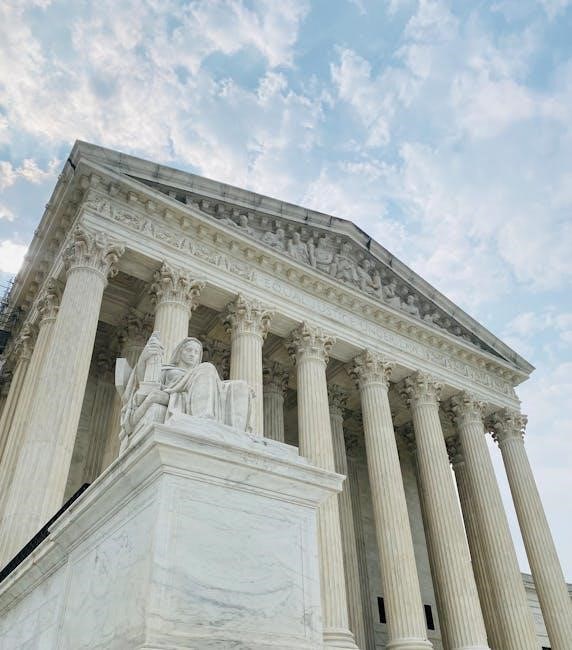Jurisprudence is the study of the science of law, focusing on its principles, theories, and practices. It explores the moral, social, and philosophical foundations of legal systems. Key resources like Jurisprudence by Sir John W. Salmond and Understanding Jurisprudence by Michael D. A. Freeman provide foundational insights into legal theory and practice.
1.1. Definition and Scope of Jurisprudence
Jurisprudence is the theoretical and practical study of law, examining its principles, sources, and applications. It explores the moral, social, and philosophical foundations of legal systems, addressing questions of justice, morality, and societal norms. The scope of jurisprudence extends to analyzing legal theories, doctrines, and practices, providing a comprehensive understanding of law as a social institution.
1.2. The Role of Jurisprudence in Legal Education
Jurisprudence plays a vital role in legal education by providing students with a foundational understanding of legal theory, principles, and practices. It fosters critical thinking and ethical reasoning, enabling future lawyers to analyze legal systems, interpret statutes, and apply justice. Jurisprudence equips students with the tools to navigate complex legal frameworks and understand the moral and societal implications of law.
Branches of Jurisprudence
Jurisprudence is divided into branches like analytical, normative, theoretical, and practical perspectives. Each branch explores legal philosophy, principles, and applications, shaping a comprehensive understanding of law and justice.
2.1. Analytical Jurisprudence
Analytical jurisprudence examines the fundamental concepts and logical structure of law. It focuses on clarifying legal terms, analyzing legal reasoning, and understanding the systematic framework of legal systems. This branch emphasizes the importance of clear definitions and logical consistency in legal theory, providing a foundation for understanding legal principles and their applications.
2.2. Normative Jurisprudence
Normative jurisprudence explores the moral and ethical dimensions of law, focusing on how legal systems ought to be structured. It examines the relationship between law and morality, justice, and social values. This branch seeks to evaluate legal principles and practices in light of normative standards, aiming to guide legal reform and improve societal justice and equity.
2.3. Theoretical and Practical Perspectives
Theoretical perspectives in jurisprudence focus on abstract concepts like justice and legal validity, while practical perspectives examine how law operates in real-world contexts. Together, these approaches provide a comprehensive understanding of legal systems, bridging the gap between philosophical theories and their application in society, as discussed in texts like Understanding Jurisprudence and Jurisprudence and Legal Theory.

Major Theories in Jurisprudence
Major theories in jurisprudence include Natural Law, Legal Positivism, and Legal Realism. These frameworks, explored in works by Salmond and Freeman, provide foundational insights into legal philosophy and practice.
3.1. Natural Law Theory
Natural Law Theory posits that law is derived from a higher, universal moral order. It emphasizes that legal systems should reflect inherent rights and wrongs, transcending human-made rules. This theory, discussed in works like Jurisprudence and Legal Theory, argues that true law must align with morality and reason, providing a moral framework for legal principles and practices.
3.2. Legal Positivism
Legal Positivism asserts that law is a set of rules established by human authorities, separate from morality. It focuses on the social facts of law’s creation and enforcement. Works like Jurisprudence by Sir John W. Salmond and Understanding Jurisprudence explore this theory, emphasizing the importance of understanding law as it is, rather than as it ought to be morally.
3.3. Legal Realism and Critical Legal Studies
Legal Realism emphasizes law’s practical application over abstract theories, focusing on judges’ decisions and social context. Critical Legal Studies critiques law as a tool of power, challenging its neutrality. These perspectives are explored in resources like Understanding Jurisprudence, offering insights into law’s dynamic and often controversial role in society and justice systems.

Sources of Law in Jurisprudence
Sources of law include legislation, judicial precedents, and customs. These elements are explored in works like Jurisprudence by Sir John W. Salmond and Michael D. A. Freeman.
4.1. Legislation
Legislation is a primary source of law, consisting of statutes and acts passed by legislative bodies. It provides the legal framework for society, ensuring consistency and enforceability. Resources like Understanding Jurisprudence by Michael D. A. Freeman and Jurisprudence and Legal Theory by James Penner detail its role and application in legal systems.
4.2. Judicial Precedents
Judicial precedents are decisions by courts that guide future cases of a similar nature. They establish legal rules and principles, ensuring consistency in the application of law. Resources such as Jurisprudence and Legal Theory by James Penner and others explore the role of precedents in shaping legal frameworks and maintaining judicial integrity.
4.3. Customs and Conventional Usages
Customs and conventional usages are long-standing practices recognized as law by communities. These unwritten norms influence legal systems, often supplementing formal legislation. Works like Jurisprudence by Sir John W. Salmond discuss their role in shaping legal traditions and their interaction with judicial precedents and statutory law, ensuring a comprehensive understanding of legal sources.

Practical Applications of Jurisprudence
Jurisprudence provides insights into law’s practical implications, guiding legal education, policy-making, and societal change. It bridges theory and practice, aiding in legal problem-solving and ethical decision-making.
5.1. Law and Morality
The interplay between law and morality is central to jurisprudence. Legal systems often reflect moral values, shaping rules that promote justice and societal welfare. Jurisprudential theories, such as natural law and legal positivism, explore whether laws should mirror moral principles or remain separate, influencing how legal frameworks address ethical dilemmas and human rights.
5.2. Justice and Social Change
Jurisprudence examines how law drives social change and upholds justice. Legal frameworks are tools for addressing inequality and promoting fairness. Theories like legal realism emphasize law’s role in reflecting societal values and implementing reforms. Jurisprudence highlights how legislation and judicial decisions can advocate for human rights and equitable policies, fostering a just society through evolving legal principles.
5.3. Economic Analysis of Law
Economic analysis of law applies economic principles to legal issues, examining efficiency, incentives, and resource allocation. Jurisprudence explores how legal rules impact market behavior and societal welfare. This approach evaluates laws’ costs and benefits, influencing policy-making and judicial decisions to optimize economic outcomes while ensuring fairness and justice in legal frameworks and societal structures.
Notable Works and Resources on Jurisprudence in PDF Format
Key PDF resources include Jurisprudence by Sir John W. Salmond, Understanding Jurisprudence by Michael D. A. Freeman, and Jurisprudence and Legal Theory by James Penner, offering insights into legal theories and principles.
6.1. “Jurisprudence” by Sir John W. Salmond
Jurisprudence by Sir John W. Salmond is a foundational text on legal theory, exploring principles, branches, and philosophical underpinnings of law. Written in the early 20th century, it remains a vital resource for understanding jurisprudence, offering insights into civil law, morality, and justice. Available in PDF, it serves as a comprehensive guide for law students and scholars.
6.2. “Understanding Jurisprudence” by Michael D. A. Freeman
Understanding Jurisprudence by Michael D. A. Freeman is a comprehensive guide to legal theory, published in 2008 by Sweet & Maxwell/Thomson Reuters. This book covers key theories and approaches to law, justice, and adjudication, offering insights into natural law, legal positivism, and critical legal studies. Available in PDF, it is a valuable resource for students and scholars of jurisprudence.
6.3. “Jurisprudence and Legal Theory” by James Penner and Others
Jurisprudence and Legal Theory by James Penner, David Schiff, and Richard Nobles offers a dialogical approach to legal theory, featuring diverse perspectives and practical insights. Praised for its comprehensive coverage, this PDF resource examines natural law, legal positivism, and critical legal studies, providing a foundational understanding of jurisprudence for students and legal professionals.
The Importance of Studying Jurisprudence
Studying jurisprudence provides foundational knowledge of legal principles, theories, and practices, essential for law students and practitioners to understand the nature and dynamics of legal systems effectively.
7.1. For Law Students and Practitioners
Studying jurisprudence equips law students and practitioners with a deep understanding of legal principles and theories. It enhances critical thinking, enabling them to analyze laws, precedents, and moral implications effectively. Resources like Jurisprudence by Sir John W. Salmond and Understanding Jurisprudence by Michael D. A. Freeman provide foundational insights, aiding in practical applications and informed decision-making within legal frameworks.
7.2. For Legislators and Policy-Makers
Jurisprudence provides legislators and policy-makers with foundational insights into legal theories and moral principles. It helps them draft laws that align with justice, morality, and societal values. Resources like Jurisprudence by Sir John W. Salmond and Understanding Jurisprudence by Michael D. A. Freeman offer critical perspectives, enabling informed decision-making and ethical legislation.

Evolution of Jurisprudential Thought
Jurisprudential thought has evolved significantly over centuries, shifting from natural law theories to modern legal positivism. Social changes and globalization have influenced its dynamic development and application.
8.1. Historical Development
Jurisprudence has evolved from ancient philosophical debates about law and justice. Early thinkers like Plato and Aristotle laid the groundwork. The Middle Ages introduced natural law theories, while the Enlightenment emphasized rational legal frameworks. Scholars like Sir John W. Salmond and Michael D. A. Freeman built on these foundations, shaping modern jurisprudential thought and its application to contemporary legal systems.
8.2. Modern and Postmodern Perspectives
Modern jurisprudence engages with critical legal studies, emphasizing the role of power and ideology in law. Postmodern perspectives deconstruct legal texts, challenging objectivity and highlighting social justice. These approaches integrate interdisciplinary insights, reflecting contemporary concerns like globalization and human rights, as seen in works by James Penner and others, offering diverse, dynamic views on legal theory and practice.
Challenges in Jurisprudence
Jurisprudence faces challenges in balancing theoretical depth with practical application, adapting to societal changes, and addressing global legal complexities while maintaining ethical and moral consistency in legal frameworks.
9.1. Balancing Theory and Practice
Balancing theory and practice in jurisprudence is crucial for legal education and application. Theoretical frameworks provide foundational knowledge, while practical insights ensure relevance to real-world legal scenarios. Resources like Jurisprudence and Legal Theory by James Penner and others emphasize this balance, offering dialogical approaches and practical insights to bridge academic and professional legal understanding effectively for students and practitioners alike.
9.2. Adapting to Social and Cultural Changes
Jurisprudence must evolve with societal shifts, addressing cultural and moral transformations. The dynamic nature of law requires theorists to reconcile traditional principles with modern values. Resources like Understanding Jurisprudence by Michael D. A. Freeman and Jurisprudence by Sir John W. Salmond explore these adaptations, emphasizing law’s role in reflecting and shaping social change while maintaining justice and equity.
The Future of Jurisprudence
The future of jurisprudence lies in emerging trends, globalization, and technological advancements. Works by Salmond and Freeman provide insights into these evolving legal landscapes.
10.1. Emerging Trends and Technologies
Emerging trends in jurisprudence include the integration of artificial intelligence and big data in legal research and decision-making. Technologies like blockchain are reshaping contract law and dispute resolution. PDF resources, such as works by Salmond and Freeman, highlight these advancements, offering insights into how technology is transforming legal theory and practice globally.
10.2. Globalization and Comparative Legal Studies
Globalization has fostered comparative legal studies, enabling cross-border analysis of legal systems. Jurisprudence PDFs, such as works by Penner and Freeman, explore how globalized legal frameworks influence local laws. This comparative approach aids in understanding diverse legal traditions, promoting unity in legal principles while respecting cultural differences, as highlighted in various jurisprudence resources.
Jurisprudence remains a cornerstone of legal education and practice, offering insights into law’s theoretical and practical dimensions. Resources like Jurisprudence PDFs by Salmond, Freeman, and Penner continue to guide scholars and practitioners, ensuring the enduring relevance of jurisprudential study in shaping legal systems globally.
11.1. The Enduring Relevance of Jurisprudence
Jurisprudence remains vital in understanding law’s theoretical foundations and practical applications. PDF resources like Salmond’s Jurisprudence and Freeman’s Understanding Jurisprudence provide timeless insights, ensuring jurisprudence’s relevance in legal education and practice, guiding scholars and practitioners in analyzing law’s moral, social, and philosophical dimensions.
11.2. Final Thoughts on the Study of Jurisprudence
The study of jurisprudence offers profound insights into law’s theoretical and practical dimensions. Through works like Salmond’s Jurisprudence and Freeman’s Understanding Jurisprudence, scholars gain a deeper understanding of legal theory, morality, and justice. Jurisprudence’s enduring relevance lies in its ability to adapt to societal changes, ensuring its continued importance in legal education and practice.
